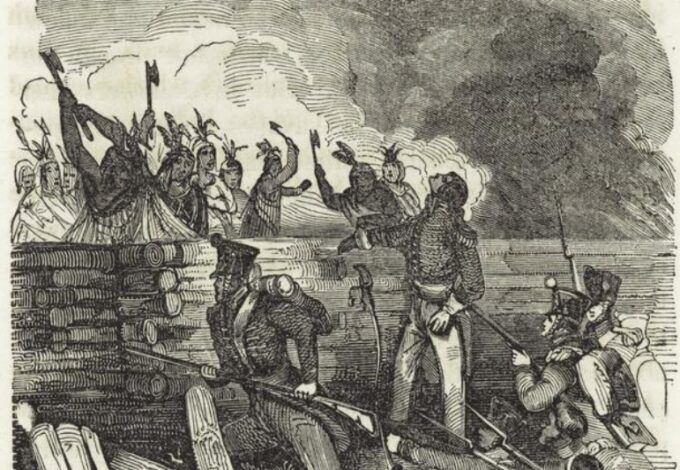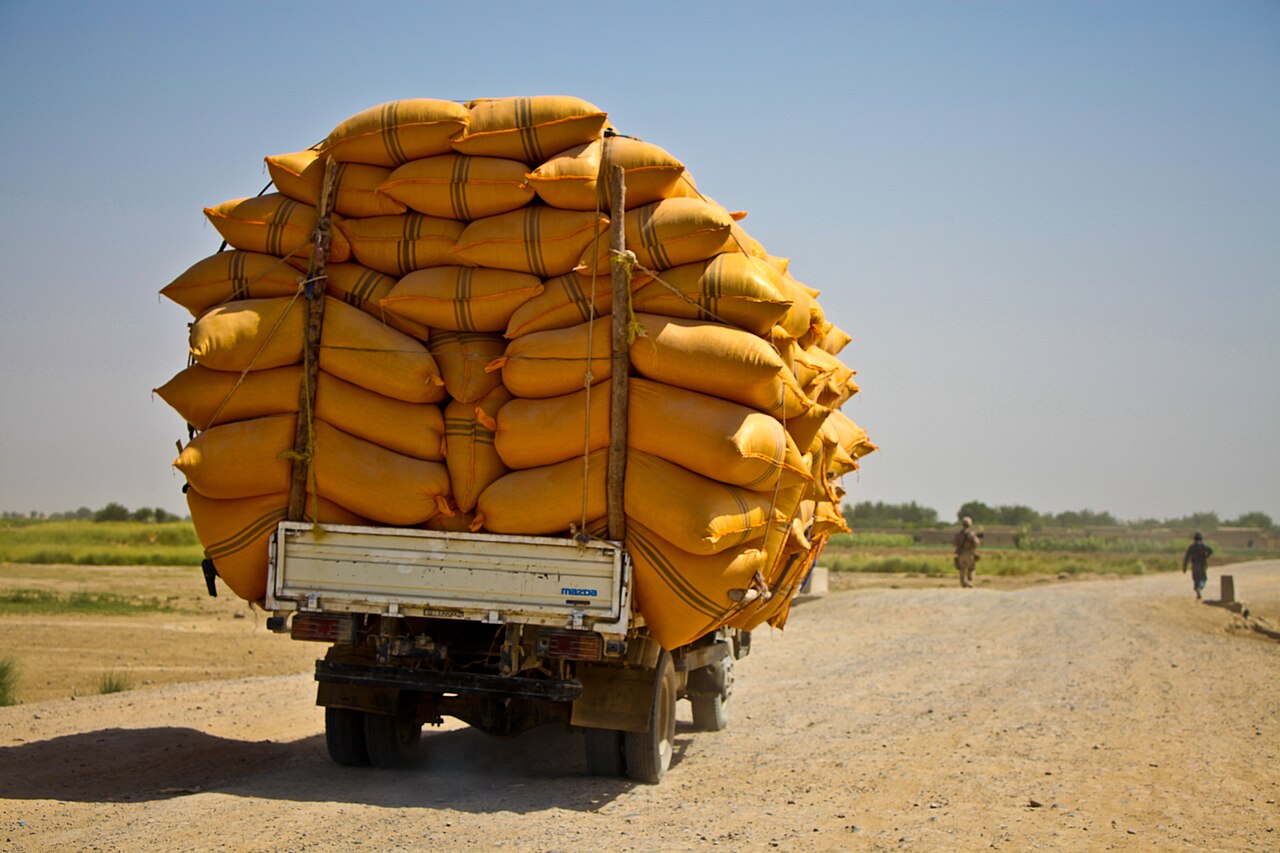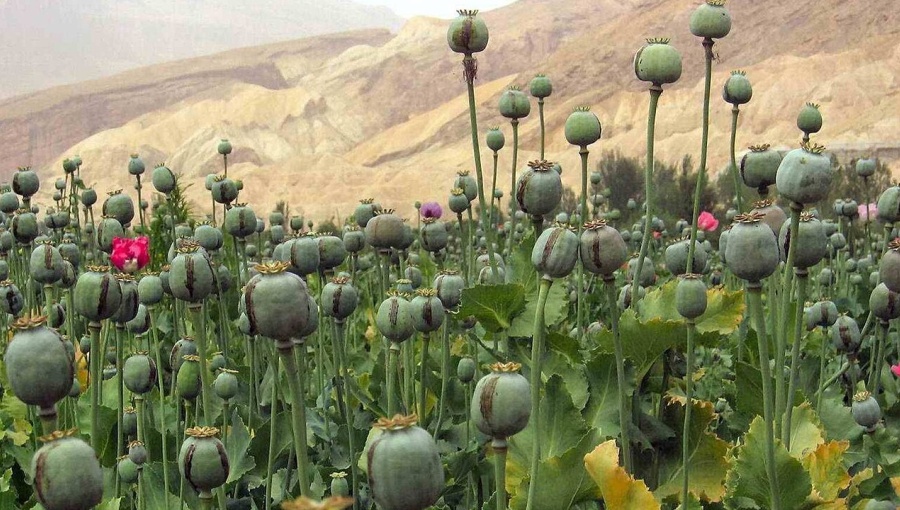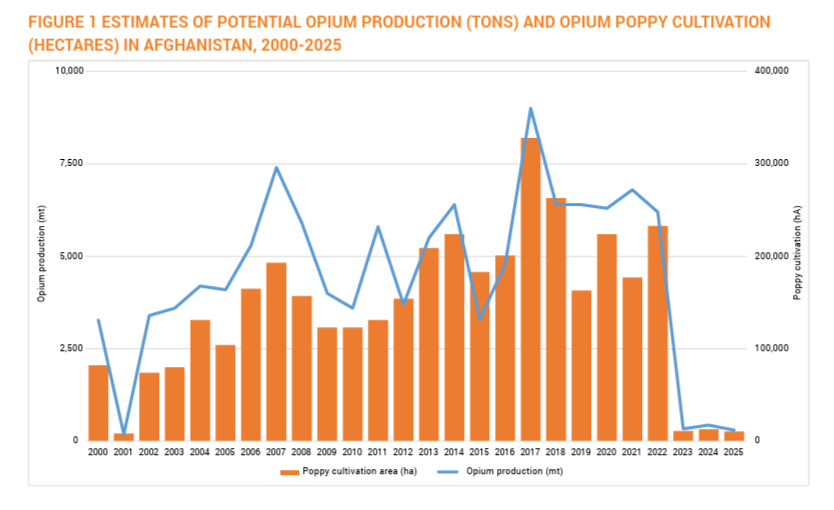
U.S. troops storm the breastworks at Horseshoe Bend – Public Domain
Andrew Jackson led armed forces into what is now Alabama on a homicidal mission against Creek Indians. Refusing to discriminate between the armed and helpless; men and women; adults and children, his agents of genocide murdered eight hundred Indigenous people. It was such a “successful” attack that Jackson feared his military superiors would not trust the veracity of his account. Given the mores and incentives of prevailing US culture ,they would assume that he was exaggerating in order to receive promotion, accolades, and other professional benefits. To gather evidence, he had his men slice off the noses of each fatality, and place them in handmade wicker baskets that, in an act of grave robbery, they stole from the villages of the murdered Natives. Jackson would later receive the award of becoming president. The US celebrates and honors his legacy with the placement of his face on the twenty dollar bill; currency functioning, without intention, as a nifty metaphor for the dark side of American “progress” and affluence. A portrait of Jackson’s face also adorns a wall in the Oval Office, where Donald Trump, while claiming to advance the legacy of his “populist” predecessor, decides what cities to strike with his secret police force, what immigrants to accost, abuse, and assign to overseas torture chambers, and what excuses to offer, no matter how flimsy, for the cold blooded execution of American citizens in the middle of residential streets.
Jackson’s war crimes amount to a straw of hay in a haystack. Through a series of official massacres, the awarding of lucrative bounties for private killers responsible for the deaths of Indigenous people, and forced removal programs, most infamously the “Trail of Tears” on which 16,000 Natives died due to starvation, freezing conditions, and preventable diseases, the US, a nation no small amount of patriotic politicians and academics tell us was founded on the ideals of freedom and equality, eliminated 96 percent of the Native population, while confiscating 98 percent of their ancestral lands. These lands included most of the minerals and resources, from fertile ground for agriculture to timber, and eventually, natural gas and oil, that allowed the US to become the wealthiest nation since the fall of the Roman Empire. Of crucial significance is the Indigenous land that settlers would transform into cotton plantations, making viable the entire system of chattel slavery for Africans.
Like a pack of wolves tearing into the flesh of mutilated deer, the US appetite for expansion was ravenous; its thirst for the spoils of bloody conquest unquenchable. From 1846 to 1848, the US fought a war with Mexico, declaring that it had a God-given right to their land. Not bothering to obtain notarization from the office of real estate in Heaven, American forces invaded Mexico, treating the people who had already lived there as brush to clear on a ranch. The result of the “Manifest Destiny” policy of invasion was Mexico’s cessation of what the world now calls Texas, Nevada, Utah, Arizona, New Mexico, and the southern part of California. Novelist Carlos Fuentes referred to the borderline between Mexico and the US as a “scar.” Immigration activists have often said, “We didn’t cross the border. The border crossed us.”
There is a word that applies to the US slaughter of the indigenous population, the expropriation of natural resources, and the violent theft of land from its neighbor to the south: colonialism. This is also the word missing from the immigration “debate” in current US discourse. Its absence renders said debate as absurd, degrading it from an opportunity for clarity, edification, and leadership into insipid chatter for officials and pundits who take for granted that the white figures of authority who inherited the benefits and advantages of the colonial system have the right to impose their will on any given situation, no matter the human costs or social consequences.
The willful failure to acknowledge the legacy and influence of colonialism creates a culture that functions according to the colonial mindset. One of the main features of this mentality is suspicion, if not outright contempt, for the population caught in the crosshairs. They are the problem, not the men or the system aiming the weapon.
And so we arrive at the hideous point of escalation when an agency founded as recently as 2003 under the name, Immigration and Customs Enforcement, has murdered an American citizen in broad daylight. Renee Nicole Good, a 37-year-old mother of three, attempted to steer her vehicle away from an ICE checkpoint, not unlike the stations of armed interrogation in occupied cities of war, when a masked ICE officer fired three bullets directly into her vehicle. If the Trump administration did not order ICE to patrol, raid, and terrorize Minneapolis, the city where the shooting occurred, Renee Good would be alive. Blaming individuals, no matter how psychopathic, misses the point, but in case anyone was prepared to resort to the “bad apple” theory, the vice president of the United States, JD Vance put that notion to rest. Standing at a podium in the White House, like a vampire whose eyeliner protects him from the sun, he said, “The precedent here is very simple. You have a federal law enforcement official engaging in federal law enforcement action. That’s a federal issue. That guy is protected by absolute immunity.”
Acting and retired prosecutors, as well as legal scholars, have rejected Vance’s “absolute immunity claim.” Legalities aside, Vance’s heartless assertion is politically useful, as it concedes governmental responsibility for Good’s death. Her murder wasn’t merely the act of a rogue agent, but the predictable consequence and logical endpoint of official US policy. Vance requested prayers for the killer, but not the victim’s family. The victim, like the millions of Indigenous people before her, the Mexican fatalities of the Mexican-American war, and immigrants who ICE separates from their families, assaults, and intimidates, are not human beings. They are colonial subjects, whose removal, as in the Indian Removal Act that led to the “Trail of Tears,” and exclusion, as in the Chinese Exclusion Act of 1882, which codified oppressive measures against Chinese immigrants, is essential to the maintenance of colonial society.
Renee Good was white, but her shared identity with the dominant culture did not provide her with any protection. Like the white allies who police beat nearly to death at Selma, she had crossed over to the other side, becoming a traitor to her race and class. After receiving training as an ICE observer through her aptly named church, St. Joan of Arc, she pledged solidarity with immigrants, vowing to use the agency of her citizenship to monitor, and to the extent that it was possible, mitigate the destructive immigration policies of US power. One protestor in Minneapolis asked on television, “If they killed a white woman in front of witnesses, how are they treating Black and brown people behind closed doors?”
She could find the answer to her question in Louisiana, where thousands of former detainees of ICE detention centers have spoken to journalists, the ACLU, and the Robert F. Kennedy Human Rights Center about widespread physical abuse, sexual harassment and assault, medical neglect, and arbitrary and retaliatory solitary confinement. Inhumane conditions include cockroach-infested food, filthy drinking water, lack of feminine hygiene products, and the use of painful shackles.
ICE sadists target women for the worst forms of violence and humiliation, advancing the colonial tradition of reserving particularly intense hatred for those who bear and most often nurture children, and therefore, protect and promote the future of their people. Beginning in the 1920s and extending through the 1970s (not exactly ancient history), federal and state programs across the US sterilized Black, Latina, and Indigenous women, either through force or without their consent during other surgical procedures. As many as 150,000 women, according to documentation obtained through a federal lawsuit, were victims of genocidal eugenics. Outside the continental United States, American officials enhanced its imperial relationship with Puerto Rico by sterilizing nearly one third of Puerto Rican women between the ages of 20 and 49. The program persisted into the 1960s. Depriving despised women of the ability to conceive children became so common that Fannie Lou Hamer, herself a victim of involuntary sterilization, referred to it as “the Mississippi appendectomy.”
The first words that the ICE agent who killed Renee Nicole Good spoke after observing her vehicle crash into a telephone pole were, “fucking bitch.” The derogation is an echo from the killing fields of Indigenous land, the Trail of Tears, and the operating rooms where thousands of women, under anesthesia and unable to speak, suffered the theft of their potential for motherhood.
The mainstream media’s indifference to the Louisiana story, along with the general public’s relative silence in the face of daily ICE actions against Latino immigrants, provokes the painful, but necessary inquiry into the morality and priorities of the American people. Vance’s admission of federal responsibility for Renee Good’s murder reflects back onto the citizenry. Despite the Trump regime’s best efforts, the US is still a democracy. As a result, the people, or “demos,” are culpable in Good’s murder, ICE’s systemic abuse of detainees, and the ongoing violation of human rights from border to border.
Camilo Pérez-Bustillo, a law professor and member of the leadership team at Witness at the Border, an immigrant advocacy and ICE-tracking organization, has dedicated his life to the cultivation of solidarity, anti-racist organization, and the elevation of consciousness within a dormant democracy. When I spoke to Pérez-Bustillo, he said, “Colonialism and imperialism provide a useful framework for connecting what is happening in Minneapolis, other cities, Venezuela, and at the border. It is not only theoretical or rhetorical. It is also concrete and material.”
“The poison of rhetoric from the White House,” as Pérez-Bustillo calls it, is intended to “not only dehumanize Renee Nicole Good, but also demonize and criminalize what she represents.” Through his work and connections with Witness at the Border, Pérez-Bustillo was able to confirm that Good received training as a “legal ICE observer.” To disparage such civil and lawful activism as “domestic terrorism,” as Vance has done repeatedly, is to spotlight that Good enrolled into the resistance against, to use Pérez-Bustillo’s words, “the colonial occupation of American cities.”
“To understand the deployment of ICE as an occupational force in our communities is the same way that the Black Panthers understood white police in Black neighborhoods,” Pérez-Bustillo said. He then referred to the civil rights movement more broadly, quoting Dr. Martin Luther King’s Riverside Church address against the Vietnam War: “The bombs that fall in Vietnam explode at home.”
In a rhythmic reprise of the late 1960s, the Trump regime’s imperial incursion into Venezuela, murder of 40 Venezuelans in their capture of Nicolás Maduro, and promise to expropriate the country’s oil forms of a figure eight knot with the domestic war against immigrants of color. The white nationalist obsession with countering an increasingly multicultural American demography, in which whites have become a minority in many cities and several states, harmonizes with the Trump administration aim to establish hemispheric dominance through the installation of right-wing governments in South America. The “Donroe Doctrine,” as Trump calls it to remind everyone that the malevolence of modern fascism is on par with its stupidity, is a more aggressive and brazen iteration of Ronald Reagan’s murderous interventions in Latin America, Bush the elder’s capture of Noriega in Nicaragua, and W. Bush’s attempted coup in Venezuela.
If Donald Trump is fentanyl to the body politic, there were plenty of gateway drugs. Perhaps there is no issue on which the inducement of psychosis that functions as US politics is more destructive than immigration. Through a series of military aggressions, typically producing high death counts, ruination of local economic orders, and termination of homegrown political movements, the US created the very conditions that birthed the so-called “migrant crisis” of mass immigration across the southern border. To maintain economic domination and political influence in the region, the US toppled governments in Guatemala, Chile, Nicaragua, and Ecuador. With subterfuge and subversion, often using tactics of violence, the US has also “intervened” in the affairs of El Salvador, Panama, and the Dominican Republic, while the CIA, with Operation CHAOS, undermined several political independence movements in Puerto Rico.
Add exploitative “trade deals,” and it becomes clear that many of the Latino immigrants to the US are merely following their wealth in search of the freedom that colonial forces on the ground in their own countries had obliterated. When they arrive, they can find employment with a multinational corporation, performing backbreaking and unsanitary labor for miserly wages, then contend with a political movement that targets them for hate crimes and harassment.
To underline the racist intent of the Trump regime, and to trace a clear connection between the colonial founding of the US and present-day policy, ICE recently detained five Native Americans in Minneapolis. Agents also tried to gain entry to Little Earth, an urban Native housing project. This is the equivalent of a cat burglar calling the police to arrest the residents of the house he plans to rob.
Camilo Pérez-Bustillo makes it clear that it is only an escape from the “colonial framework” that will emancipate the US from its cycle of violence, and generate a genuine transformation in political policy and morality. The inability to break free of the ideological restrains of the colonial mentality explains why, according to Pérez-Bustillo, nearly everyone across the mainstream political spectrum “concedes that undocumented immigrants, or at least many of them, constitute a threat to the United States, and concedes the necessity of militarization of the border.”
“A decolonial framework can liberate us from the limits of our discourse,” Pérez-Bustillo said. As ICE spreads terror in American cities, with tactics that now include homicide, it is helpful to remember that “Abolish ICE” was one a popular slogan and movement on the left. All Republicans and most Democrats treated the position as it was a manifesto for the demolition of indoor plumbing.
Natascha Elena Uhlmann, an immigrant rights activist and journalist, wrote a book in 2019 with the slogan as her title. She begins with following sentences: “Perhaps the greatest value of history is that it reveals to us how contingent so much of the world really is. Institutions that seem unyielding and hierarchies that seem immutable reveal themselves to be the products of chance and ideology.” The colonial ideology rests on the foundation of the racist assumption that, as Uhlmann argues, immigration is “an affront to an imagined racial/national identity.” Her warning that “we cannot allow a nation so steeped in violence set the terms of the [immigration] debate” now reads like a meteorological forecast of a category five hurricane that no one in the eye of the storm bothered to consider.
Another consistent voice against the whirlwind, pleading for solidarity and sanity is the National Book Award winning poet and Puerto Rican activist, Martín Espada. I spoke to him about immigration and colonialism, and he said, “The true borders for Latinos in this country have always been the borders of racism.” He later explained that there is “so little solidarity with Latinos,” especially of the heroic quality that Renee Nicole Good demonstrated, because “Latinos do not have a place at the table. Latinos constitute approximately twenty percent of the population, yet there is a serious underrepresentation in electoral politics, media, education, and the arts.”
Too often missing from the discourse is the clarity and profundity that Espada offers with his poem, “The Iguanas Skitter Through the Cemetery by the Sea.”
Set in Viejo San Juan, Puerto Rico, Espada’s poem presents iguanas in different form in each stanza, beginning with their invasion of sovereignty and history. “The iguanas slither from the branches of trees splintered by the hurricanes,” Espada writes in the opening line, later locating the reptilian predators elsewhere, “The iguanas multiply through the night of blackouts in hospitals and morgues. / The iguanas burrow beneath roads to bury their eggs in the lungs of cities. / The iguanas slap their clawed feet as they churn the earth of the farmer’s field.”
The iguanas are omnipresent, gathering strength in numbers and power in their ubiquity. As they slither, crawl, and claw their way into every corner of Puerto Rico, they soon claim the island as their own. But they know nothing of the history and culture that they violate. “…The iguanas stare stupefied at the bust / of a mustachioed poet who died after the bacteria feasted on his heart,” Espada tells his audience before elaborating on their state of ignorance: “The iguanas know nothing of Albizu: The lawyer and the cane cutters’ strike, the crowd listening in the rain, cane stalks in their heads igniting like torches.”
Their small minds and obliviousness cannot slow down their march. Signs of their influence are soon everywhere. “The green of the iguanas in the cemetery is the green of soldiers in uniform. / The green of the iguanas in the cemetery is the green of felt at the casinos. / The green of the iguanas in the cemetery is the green of cash on cruise ships.”
The poem continues until Espada puts the lizards through another metamorphosis, reminding readers that filmmakers during the Cold War used iguanas to depict dinosaurs. Espada ends with a reminder that even the most ferocious and monstrous beasts eventually find their doom:
“The dead eyes of the iguanas, keeping vigil over the city of the dead, will never / see the asteroid of their extinction, the earth melting to suck their bones into / whirlpools of mud, the wave sweeping them to sea, the flight of the poet’s kingbird.”
As millions of people struggle for freedom and self-determination, they await an extinction event for colonialism. The murder of Renee Nicole Good, like the deaths of immigrants whose names the powerful never even utter, becomes yet another tragic means of marking the time until there is transformation of our political ecology. It is a transformation that depends upon the propulsion of mourning; the alchemy of pain into action.
This essay also ran on the author’s Substack, Absurdia Now.




